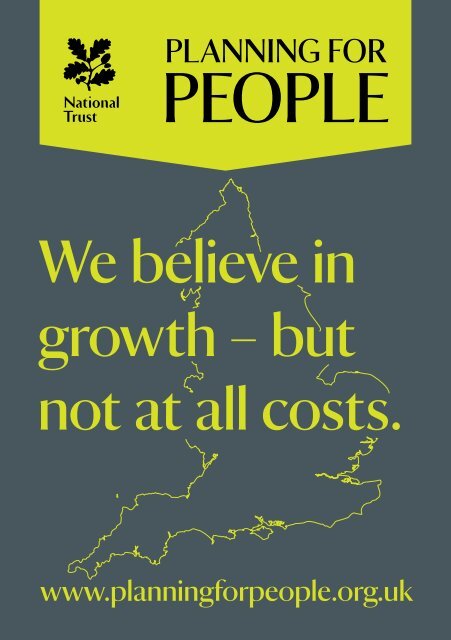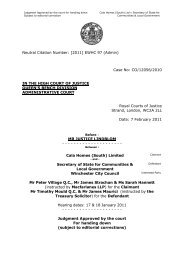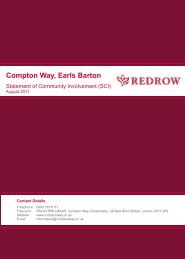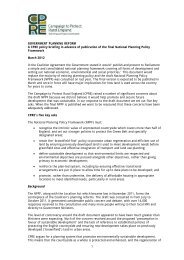Manifesto - Political Developments Limited - PDL
Manifesto - Political Developments Limited - PDL
Manifesto - Political Developments Limited - PDL
You also want an ePaper? Increase the reach of your titles
YUMPU automatically turns print PDFs into web optimized ePapers that Google loves.
We believe in<br />
growth – but<br />
not at all costs.
Planning is for people<br />
The National Trust has championed a strong, effective land use planning<br />
system in England since the 1920s. It is the means by which our beautiful<br />
and productive countryside, heritage and landscapes are protected; and<br />
by which we ensure there are good, vibrant villages, towns and cities in<br />
which to live and work.<br />
The planning system can and should change. Indeed it has evolved<br />
significantly over the decades in response to new needs. But at its heart is the<br />
principle of balance. Planning exists to serve the economy, society and the<br />
environment. That principle should underpin any reform.<br />
We support the simplification and streamlining of the planning system, and<br />
share an ambition for greater engagement by local people in the decisions<br />
that most affect them. We support the provision of land for housing, for<br />
developments leading to new jobs, and for new infrastructure. We also,<br />
clearly, support a continuing commitment to protecting our environment in<br />
its broadest sense.<br />
What we question is the present draft National Planning Policy Framework<br />
(NPPF). In our view it will not deliver these goals. By being weighted so<br />
heavily in the interests of economic development, the NPPF does not deliver<br />
the truly sustainable approach that it promises. By failing adequately to<br />
define clearly how decisions are to be made, it opens up the prospect of<br />
greater uncertainty and delay for participants in the planning system. And by<br />
insisting on a default ‘yes’ to development, it takes power even further away<br />
from local people.<br />
Here we set out our positive vision for planning and the changes we believe<br />
are necessary to the draft NPPF.<br />
©National Trust Images/Brian and Nina Chapple<br />
Planning for people 1
Planning and the National Trust<br />
We are a conservation charity of over 3.9 million members. We were created<br />
more than 115 years ago to care for special places, for ever and for everyone. To<br />
achieve these goals we look after a quarter of a million hectares of land, over<br />
700 miles of coastline, several hundred historic houses and their gardens and<br />
parks, and many thousands of vernacular buildings. Many millions visit and<br />
enjoy our places, while over 60,000 people volunteer with us on a regular basis.<br />
We are, therefore, a major business as well as a charity and sometimes too a<br />
developer, building visitor facilities, converting buildings for business use, and<br />
providing housing to support our conservation work. In fact, over the last ten<br />
years the National Trust has built or had consent for over 900 homes to be<br />
sold on a commercial basis, as well as a number of affordable homes for rent.<br />
As a participant in the planning system, we recognise the importance of a<br />
fair and balanced decision-making process. We support a plan-led system<br />
as a means to provide certainty and confidence, and a way to deliver ‘smart’<br />
growth: good development in the right place which we can be confident<br />
meets long term needs. We support streamlining the planning system where<br />
appropriate to make it easier to participate in, and we support the shift<br />
towards a greater local say.<br />
The Stamford Brook development is sustainable housing on a commercial<br />
scale developed by the National Trust working with Redrow Homes and<br />
Bryant Homes. It is built on 3,000 acres of land that once formed part of the<br />
Dunham Massey Estate in Cheshire. Stamford Brook was designed through<br />
a triple-bottom-line approach, balancing environmental, community and<br />
financial needs.<br />
On the Lizard in Cornwall and at Studland in Dorset, the National Trust has<br />
supported the development of new affordable houses for local people to rent.<br />
When the National Trust develops sites we:<br />
— Adhere to the policies in the relevant local plan.<br />
— Deliver energy efficiency and reduce carbon dioxide emissions.<br />
— Build in harmony with the local environment, built and natural.<br />
— Involve the local community throughout the process.<br />
Our vision for planning<br />
Planning exists to create great places for people to live and work, both today<br />
and tomorrow. Effective planning should promote good development, which<br />
contributes to prosperity and growth. It should not be used merely as a tool<br />
to drive short-term economic gain.<br />
A robust planning system guides good, necessary development to the right<br />
places. It ensures that poorly designed developments and those in the wrong<br />
place don’t get built. It protects the things that matter to us all, from open<br />
spaces, green fields and productive agricultural land to much-loved historic<br />
city centres, towns and villages. And a robust system should deliver the new<br />
homes, shops and services that communities want, where they want them.<br />
At the same time, effective planning should minimise the burdens of<br />
bureaucracy, cost and delay. It should provide certainty about the ground<br />
rules by which decisions are made. But it should ensure freedom within this<br />
framework, so that individuals, companies and communities can exercise<br />
choice for the long-term in a balanced way.<br />
Any new planning system should therefore:<br />
— Be balanced, establishing a framework for integrating economic,<br />
environmental and social concerns.<br />
— Safeguard the public’s interest by recognising the value of and protecting<br />
the countryside, heritage and nature.<br />
— Start from what people value about their place, and their aspirations for<br />
its future.<br />
— Give people a genuine say, and not undermine localism by insisting on an<br />
automatic ‘yes’ as the response to development proposals.<br />
— Work in practice, by using clear and consistent definitions so that<br />
everyone has the same understanding of the rules and we do not see<br />
planning by appeal become the norm.<br />
2 Planning for people Planning for people 3
Planning is for people<br />
Long-term thinking and a balanced system<br />
1The Planning system should not be used as a blunt tool to ‘pro-actively<br />
drive development’. Its guiding principle has been to act in the public<br />
interest, balancing the needs of people and the environment with those<br />
of the economy. The NPPF should be rewritten throughout to make it a<br />
balanced document.<br />
2Planning should promote genuinely sustainable development. In<br />
particular, the presumption in favour of sustainable development should<br />
only apply when plans or proposals can be shown to deliver multiple positive<br />
outcomes for people and the environment as well as economic growth.<br />
3Clause 130 of the Localism Bill should be removed. We are opposed in<br />
principle to a provision that privileges financial inducements within the<br />
decision making process.<br />
Integrating necessary development with the protection of the<br />
countryside, heritage and the natural environment<br />
4The NPPF should act in everyone’s interest to safeguard the things we<br />
value. There should be no weakening of protection for the designated<br />
natural and the historic environment. The countryside has value for its own<br />
sake. Development of the best and most versatile agricultural land should be<br />
strongly resisted on grounds of food security and landscape protection.<br />
5The NPPF should adopt an explicit ‘brownfield first’ approach. It<br />
should be clear that developers should seek to use previously developed<br />
land before green field sites are considered. There should be exemptions<br />
for brownfield sites of the highest public interest, including for nature and<br />
heritage.<br />
6The NPPF should provide a five year supply of land for housing but the<br />
requirement to identify an additional 20 per cent of land should be<br />
dropped. Delivering confidently a five year housing land supply will be a big<br />
step forward. Requiring more than this will put greater pressure on green<br />
fields, whether protected or not. The NPPF should promote the provision of<br />
affordable housing.<br />
A genuine say<br />
7The default ‘yes’ and requirement to grant permission where a plan<br />
is out-of-date, indeterminate or silent is irresponsible and must be<br />
removed. Local authorities should have the ability to refuse development<br />
proposals where they would cause harm.<br />
8Localism should be real: communities should be given genuine power to<br />
shape their area for the better. It should be clear that neighbourhoods<br />
can opt for less development as well as more than in the local plan, and that<br />
local authorities who wish to set high standards for development are free to<br />
do so through the use of supplementary guidance.<br />
9It is fundamentally wrong that neighbourhood plans should be led and<br />
funded by business. It should be a core principle of the reforms that any<br />
plans whether at neighbourhood or local authority level should be genuinely<br />
community led.<br />
There should be a limited right of appeal for communities, in<br />
10circumstances where consent is granted for development that is<br />
inconsistent with the plan. This should be guaranteed by the Localism Bill.<br />
www.planningforpeople.org.uk<br />
4 Planning for people Planning for people 5
Heelis<br />
Kemble Drive<br />
Swindon<br />
Wiltshire SN2 2NA<br />
© National Trust 2011<br />
Registered charity no. 205846<br />
Printed on 100% recycled paper<br />
This document is available in alternative formats<br />
on request from press.office@nationaltrust.org.uk<br />
or telephone 0844 8004955





